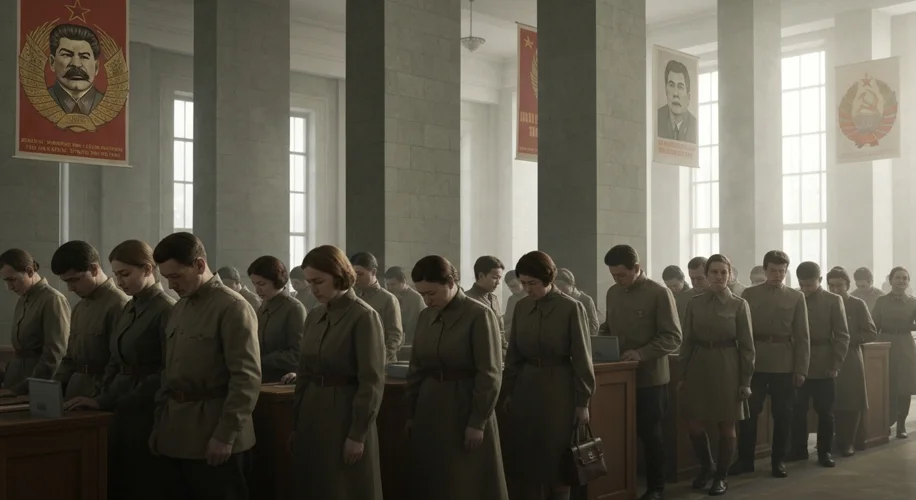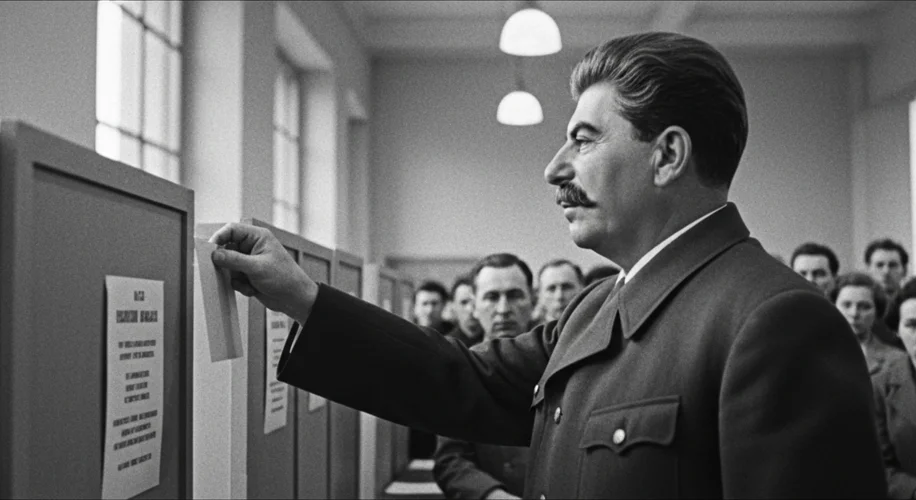The air in Moscow on December 12, 1937, was crisp, the kind that bites at exposed skin, yet the atmosphere crackled with an almost festive energy. Citizens, bundled in heavy coats and hats, queued patiently outside polling stations. Joseph Stalin himself, the iron-willed leader of the Soviet Union, was seen casting his vote, a solitary figure amidst the throngs. But this was no ordinary democratic exercise; it was a meticulously staged performance, a grand spectacle designed to legitimize and consolidate Stalin’s iron grip on power.
The backdrop to this electoral pantomime was the newly enacted 1936 Soviet Constitution, a document hailed by the regime as the world’s most democratic. It promised universal suffrage, direct elections, and freedom of speech. In reality, it was a sophisticated piece of propaganda, a shimmering veneer over a brutal totalitarian reality. The Soviet Union was in the throes of the Great Purge, a period of intense political repression and state-sanctioned terror that had begun in earnest in 1936. Millions were arrested, executed, or sent to forced labor camps, their supposed crimes ranging from espionage and sabotage to mere association with perceived enemies of the state.
The election for the Supreme Soviet, the highest legislative body in the USSR, was presented as the people’s endorsement of this new, ostensibly democratic order. The Communist Party of the Soviet Union (CPSU), along with its allied non-party bloc, was the sole contender. Voters were presented with a single list of candidates, all vetted and approved by the Party. The choice was stark: vote for the Party’s nominees or cast a blank ballot – an act of defiance so perilous it was rarely contemplated, let alone carried out. Such an act would almost certainly mark one for suspicion, interrogation, and potentially worse.

Stalin’s personal participation was a deliberate act of political theater. His image was ubiquitous – on posters, in newspapers, in newsreels. By appearing at the polling station, he projected an image of a leader engaged with his people, a man of the masses. This was crucial for cementing his cult of personality, an essential tool for maintaining absolute control. The narrative was carefully crafted: the Great Leader, embodying the will of the people, participating in the most democratic election in history. The reality, however, was far more chilling. The vast majority of Soviet citizens understood that this was not a choice, but a duty, a ritualistic affirmation of the existing power structure.
The results of the election were, predictably, a resounding success for the Party. Over 99% of the vote went to the CPSU coalition. The turnout was reported at an astonishing 98.6%. These figures, presented as irrefutable proof of the people’s support, were nothing more than a testament to the effectiveness of Soviet control and propaganda. The election served as a powerful tool to mask the ongoing purges and to project an image of national unity and popular legitimacy to the outside world. It demonstrated the regime’s ability to mobilize the population and to extract public displays of loyalty, even under the shadow of pervasive fear.
The 1937 election was a masterful stroke of political manipulation. It was not an election in the Western sense of the word, a contest of ideas and candidates, but a carefully orchestrated plebiscite, a ritual of submission. It showcased the Soviet Union under Stalin not as a democracy, but as a highly centralized, authoritarian state where dissent was brutally suppressed, and public life was a stage for the unchallenged power of the Party and its leader. The image of Stalin casting his vote, framed by compliant voters, remains a potent symbol of a system that prioritized spectacle and control over genuine freedom and choice. It serves as a stark reminder that even the most democratic-looking institutions can be perverted into instruments of tyranny when power is absolute and unchecked.

